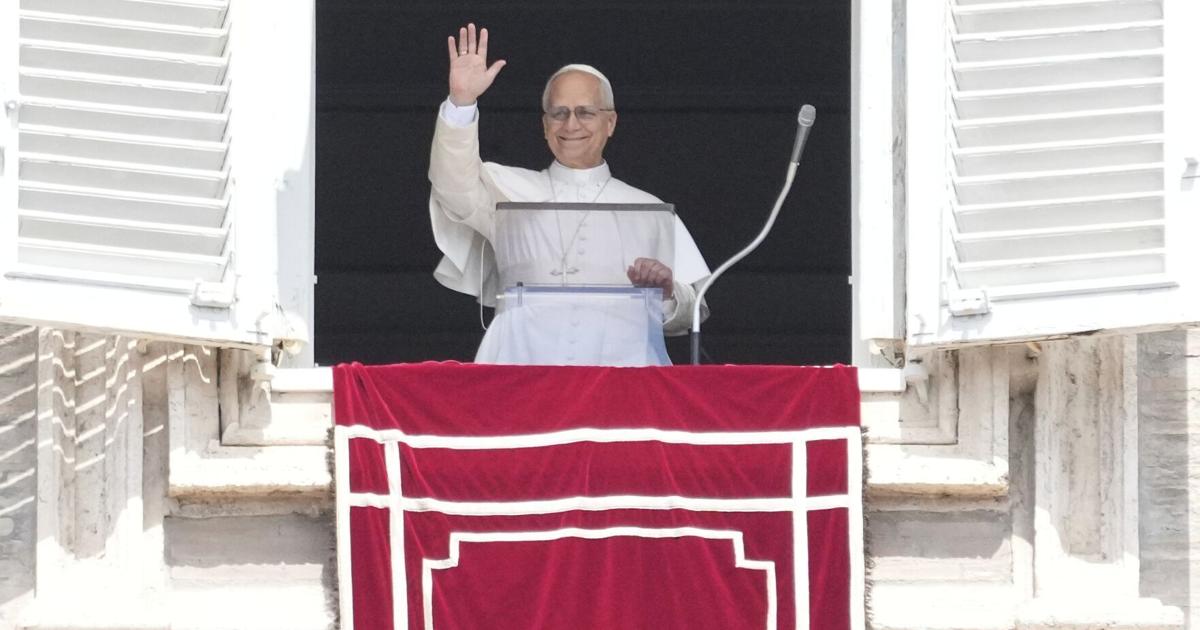A panel of four Carroll College officials discussed Pope Leo XIV’s first 100 days of his pontificate citing the war in Gaza, artificial intelligence and a willingness to listen.
Dozens of community members and students gathered at the private Catholic college for an Aug. 28 discussion where Carroll Co-President and Bishop of Helena Austin A. Vetter, History Department Chair Jeanette Fregulia, Associate Professor of Theology Katherine Greiner and Philosophy and Catholic Studies Chair Mark Smillie talked about their takeaways regarding speeches and stances made by the pope.
Pope Leo XIV delivers the Angelus prayer in St. Peter’s Square at the Vatican, Sunday, Aug. 24, 2025.
AP Photo/Gregorio Borgia
Leo, from Latin meaning lion, was discussed by Fegulia during the panel discussion.
“What kind of lion is this Leo?” she asked the crowd.
Fregulia said she could not wait to see what was next for the religious figure who was elected May 8, succeeding Pope Francis.
“I propose a gentle lion for the faith, for social justice, for the care of humanity and the planet, for welcoming all people of good will,” she said. “A man also deeply connected to Latin America. A pope unafraid to speak out about starvation in Gaza, the attack on the Annunciation Parish School or what is happening in Ukraine.”
Carroll College History Department Chair Jeanette Fregulia speaks to dozens of people in the Lower Campus Center Aug. 28 about Pope Leo XIV’s first 100 days.
SONNY TAPIA, Independent Record
Smillie, who’s confirmation name was Leo, said he was surprised when the man born as Robert Francis Prevost discussed the reason for choosing Leo as his new name.
The Philosophy and Catholic Studies Chair said the pope chose his name because AI was motivation.
He cited Leo’s predecessor, Pope Francis, who said “AI technologies post great risks, but also have immense potential to bear good fruit.”
Pope Leo XIV took the artificial intelligence issue to a moral one, according to Smillie.
“Leo showed a deep awareness of contemporary technology and culture, which he argued, possessed an inherently ethical dimension that threatens human dignity through functions, automations, simulations and algorithms,” Smillie said.
Carroll College Philosophy and Catholic Studies Chair Mark Smillie talks about Pope Leo XIV’s first 100 days during a panel discussion Aug. 28 in front of dozens of community members and students.
SONNY TAPIA, Independent Record
Vetter took a different approach to the new pope’s first 100 days outside of technology, war and social justice reforms. The bishop said he continuously saw headlines that claimed Pope Leo XIV was the first American pope, but he would correct it.
“It’s the first pope from America. He’s not American, he’s from America,” Vetter said. “But, he’s the pope for the world.”
Vetter said Leo had somewhat of an advantage over Pope Francis because he was from America. Leo spoke five languages and parts of others, the bishop added, so for English speakers in America, it was an opportunity to listen in a different light.
Dozens of community members gather in the Lower Campus Center at Carroll College Aug. 28 to hear a panel discussion about the first 100 days of Pope Leo XIV’s pontificate.
SONNY TAPIA, Independent Record
“I think for us as Catholics in the United States, it’s a really big challenge now, because (we need) to really listen with an open heart to Pope Leo XIV,” Vetter said.
With Pope Francis being from Argentina, Vetter added some felt he could not relate to the wealth division in the U.S. or other social issues, but that was not the case anymore since Leo was from Chicago.
“I think it’s going to be a real gift to us and an opportunity for a deeper conversion,” he said.
Bishop Austin Vetter talks with reporters on May 9, 2025, about the recent election of Pope Leo XIV.
THOM BRIDGE, Independent Record
Greiner talked about the collective peace she heard coming from cardinals who were a part of the conclave that aided the selection of Pope Leo XIV.
“Leo understands that to be a church that moves forward we must be a church that remains rooted in the tradition,” Greiner said. “…His vision for the future is not breaking tradition, but in continuity with that tradition.”
She said there should be pride from the Catholic church and its congregation in the U.S., but it should also serve as a reminder that the church was much bigger than America.
Katherine Greiner, Carroll College associate professor of theology, speaks Aug. 28 to a crowd about Pope Leo XIV’s first 100 days.
SONNY TAPIA, Independent Record
Sonny Tapia is a criminal justice and education reporter for the Helena Independent Record.
